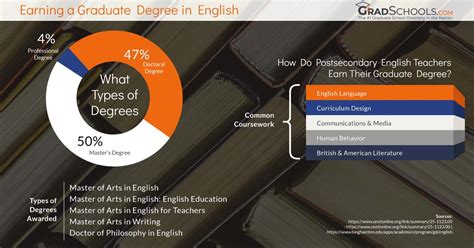Introduction

Pursuing an English graduate degree empowers you to delve deeply into the multifaceted world of literature, language, and communication. With a plethora of programs available, it can be daunting to navigate the options and identify the ones that align with your aspirations. To guide you on this journey, we present a comprehensive overview of the top English graduate programs, highlighting their unique strengths and offerings.
Top English Graduate Programs
1. Harvard University
- Program: Ph.D. in English
-
Highlights:
- Renowned faculty with expertise in a wide range of literary genres and periods
- Access to world-class libraries and research centers
- Strong support for graduate students, including funding and professional development opportunities
2. University of California, Berkeley
- Program: M.A. and Ph.D. in English
-
Highlights:
- Diverse course offerings covering literature, theory, and creative writing
- Collaborative research opportunities with faculty and fellow students
- Extensive support for graduate students, including teaching fellowships and writing workshops
3. Yale University
- Program: M.F.A. in Creative Writing
-
Highlights:
- Prestigious program with a focus on fostering exceptional writing skills
- Mentorship from renowned authors and literary scholars
- Opportunities to connect with the broader literary community through readings and events
4. Stanford University
- Program: M.A. and Ph.D. in English
-
Highlights:
- Interdisciplinary approach that combines literature, theory, and cultural studies
- Access to cutting-edge research facilities and technological resources
- Emphasis on social justice and community engagement through literature and writing
5. University of Chicago
- Program: M.A. and Ph.D. in English
-
Highlights:
- Rigorous academic environment with a strong emphasis on critical analysis
- Opportunities to study with leading scholars in literary theory, history, and criticism
- Collaborative research projects that foster interdisciplinary perspectives
Factors to Consider When Choosing a Program
When evaluating English graduate programs, it is essential to consider the following factors:
- Research Focus: Identify programs that align with your research interests.
- Faculty Expertise: Research the backgrounds and publications of faculty members.
- Funding Opportunities: Explore available funding sources, including fellowships, scholarships, and teaching assistantships.
- Location: Consider the program’s proximity to cultural institutions, libraries, and literary events.
- Program Structure: Determine whether the program offers coursework, research, or a combination of both.
- Career Outcomes: Investigate the career paths of program graduates and the resources available for professional development.
Tips and Tricks for Success
- Engage with Faculty: Attend office hours, seek guidance, and actively participate in discussions.
- Build a Strong Writing Portfolio: Showcase your writing skills through coursework, independent projects, and literary journals.
- Network with Peers and Professionals: Attend conferences, join writing groups, and connect with authors and scholars.
- Explore Interdisciplinary Approaches: Expand your knowledge base by taking courses in related fields such as history, philosophy, and gender studies.
- Utilize Resources: Take advantage of libraries, research centers, and writing centers to enhance your research and writing abilities.
Pros and Cons
Pros of Pursuing an English Graduate Degree:
- Deepen your understanding of literature, language, and communication
- Develop critical thinking, analytical, and writing skills
- Prepare for careers in academia, publishing, writing, and education
- Engage in cutting-edge research and contribute to the advancement of the field
Cons of Pursuing an English Graduate Degree:
- Competitive admissions process
- Rigorous academic workload
- Limited job market in some fields
- Financial costs of graduate education
FAQs
-
What are the different types of English graduate degrees?
* Master of Arts (M.A.): Focuses on coursework and may include a thesis or project.
* Master of Fine Arts (M.F.A.): Emphasizes creative writing and typically requires a portfolio.
* Doctor of Philosophy (Ph.D.): Designed for individuals seeking a career in academia or research. -
What is the average cost of an English graduate degree?
* According to the College Board, the average cost of tuition and fees for a public graduate school is $18,923 per year for in-state students and $36,186 for out-of-state students. For private graduate schools, the average cost is $46,925 per year. -
What are some of the potential career paths for English graduate degree holders?
* Professor
* Writer
* Editor
* Publisher
* Librarian
* Communications Specialist -
How long does it typically take to complete an English graduate degree?
* A Master’s degree typically takes 1-2 years to complete. A Ph.D. degree typically takes 4-7 years to complete. -
Is there a job market for English graduate degree holders?
* While the job market can vary depending on the field and level of degree, there is a growing demand for professionals with strong communication, analytical, and writing skills in various industries. -
What are some of the skills that English graduate degree holders develop?
* Critical thinking
* Analytical reading
* Writing and editing
* Communication
* Research
* Literary analysis -
How can I prepare for graduate school in English?
* Develop strong writing and research skills
* Build a strong academic foundation in literature and language
* Engage in literary activities, such as attending readings and writing workshops
* Seek out mentorship from professors and professionals in the field -
What is a “dissertation”?
* A dissertation is a substantial research project that is typically required for the completion of a Ph.D. degree. It demonstrates the candidate’s research skills, analytical abilities, and ability to contribute original scholarship to the field of study.
